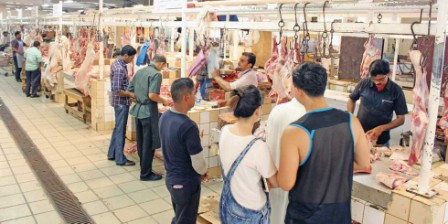Subsidy cut: heat now on the working class
Manama
The subsidy cut on meat, which is to be implemented from September 1, is seemingly going to affect adversely the expatriate working class and small restaurants. However, the aristocrats and the big restaurants will be least affected by this decision.
The Minister of Industry and Commerce, Zayed bin Rashid Al Zayani, had confirmed a day earlier that meat subsidiy would be stripped from September 1 to revitalize the commercial movement in the Kingdom and to boost the import of live and chilled meat.
The Parliamentary Committee working on the issue of “redirecting the benefits of subsidy to Bahraini nationals only” could not reach a consensus yesterday also.
Meanwhile, Shura Council Member Bassam Ismael Ebrahim and the member of the Finance Committee in Shura Council said that they were keen to meet the government committee once again before the enforcement of the decision.
He said that the subsidy issue was a very hot one and they really wanted to know how the government was going to do it. “We are looking forward to the second meeting to trace the real facts and figures on the issue,” he said. “We also want to know its economic, social and the political impacts at a larger scale.”
The vast majority of the customers of the big restaurants are least bothered by the hike in prices.
Manager of a big restaurant in Amwaj commented that the subsidies cut on meat would not affect them at all. “Nobody here orders after checking the price. Maybe, four per cent of our customers look at the prices.”
The price of the subsidized meat is one dinar per kilogram now. After the subsidy is lifted it will become almost BD2.5/kg or BD3/kg.
Currently, the price of a meat dish per plate is about one dinar and is affordable for the common worker. But after September 1, the price per plate will exceed BD2. It would not be possible for the common man to eat meat in the restaurants then.
Lifting of the subsidies will be a blessing in disguise for the importers of Pakistani and Indian meat as they are better in quality than the subsidized Australian meat.
When the difference in prices does not remain a considerable factor, then majority of the people would not prefer the Australian meat. As a result the market of Pakistani and Indian meat can flourish.
The working class who is cooking food at home can afford meat more than four times a week now, but after September 1, it will be difficult for them to do so even twice a month.
Generally it is the impression among the labourers that they can eat anything they like as the food items are subsidised in Bahrain.
Haji Saeed, an expat mason, said that the poor man would be done for. “How can a poor man eat meat at the price of BD3/kg?” he queried.
Tariq, another mason from Pakistan, said that now they could spend their month in shared accommodation for BD30. “But after the subsidies on water and electricity are also lifted the monthly expenditure is expected to increase by BD60 to BD70.”
“The monthly salary of a labourer is almost BD70 and after overtime he touches the figure of BD100 while the salary of a mason is BD100 and he earns BD150 after availing overtime. When no money is saved, what will be left for the poor worker to do here?” he lamented. “If the salary of a worker is increased to at least BD150 and that of the mason to BD200, they can survive.”
Naseer, a worker from Pakistan, said they could live without meat but not without saving. According to him, if they could not save anything after the subsidy support is lifted, they would not like to live in Bahrain anymore.
“What I can imagine is that the disparity of income among the workers in Pakistan and in Bahrain is going to be naught. If prosperity does not follow, then what is the use of coming to Bahrain leaving our homes?” Naseer asked.
Related Posts

